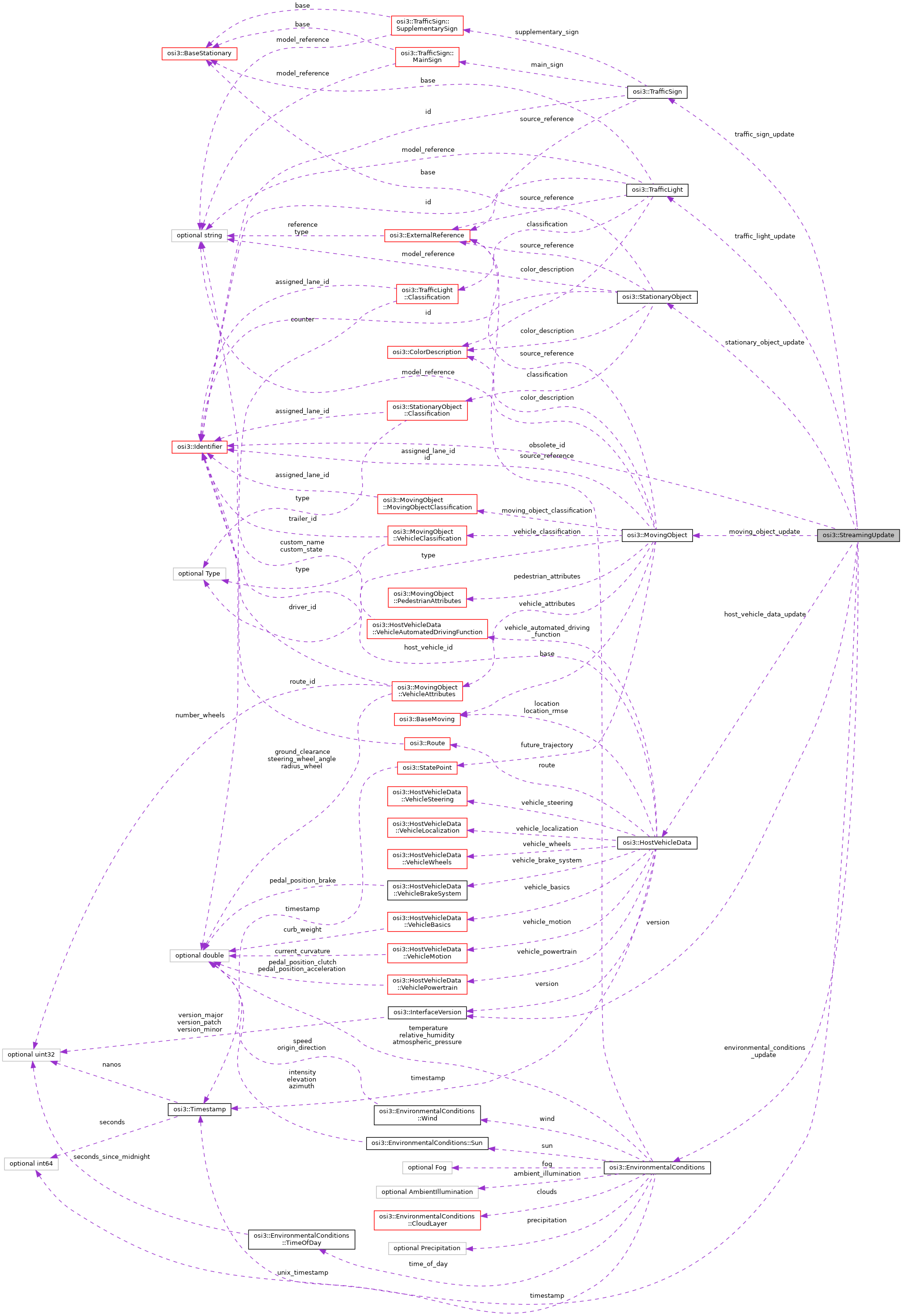osi3::StreamingUpdate Struct Reference
Public Attributes
| optional InterfaceVersion | version = 1 |
| The interface version used by the sender. More... | |
| optional Timestamp | timestamp = 2 |
| The data timestamp where the information of contained objects is calculated. More... | |
| repeated StationaryObject | stationary_object_update = 3 |
| The list of stationary objects (excluding traffic signs and traffic lights). More... | |
| repeated MovingObject | moving_object_update = 4 |
| The list of moving objects. More... | |
| repeated TrafficSign | traffic_sign_update = 5 |
| The list of traffic signs. More... | |
| repeated TrafficLight | traffic_light_update = 6 |
| The list of traffic lights. More... | |
| optional EnvironmentalConditions | environmental_conditions_update = 7 |
| Conditions of the environment. More... | |
| repeated HostVehicleData | host_vehicle_data_update = 8 |
| Host vehicle data. More... | |
| repeated Identifier | obsolete_id = 9 |
| Entities that will no longer be updated, because they are considered obsolete by the sender. More... | |
Detailed Description
The streaming update interface enables simulation entities to send partial updates to other modules that favor performance (especially latency) over data completeness/consistency (e.g.
visualization applications).
Static and/or non-relevant objects can be omitted as required for the specific use case. Adding an object's unique id to the repeated field obsolete_id indicates that it will no longer be updated from then on.
- Note
- The receiver of partial streaming update messages can only rely on the most up-to-date information at the corresponding timestamp. E.g. omitting objects does not indicate static behavior but it may be sufficient for the use case to update certain objects at a later point in time.
Member Data Documentation
◆ version
| optional InterfaceVersion osi3::StreamingUpdate::version = 1 |
The interface version used by the sender.
- Rules
- is_set
◆ timestamp
| optional Timestamp osi3::StreamingUpdate::timestamp = 2 |
The data timestamp where the information of contained objects is calculated.
Zero time is arbitrary but must be identical for all messages. Zero time does not need to coincide with the UNIX epoch. Recommended is the starting time point of the simulation.
- Rules
- is_set
◆ stationary_object_update
| repeated StationaryObject osi3::StreamingUpdate::stationary_object_update = 3 |
The list of stationary objects (excluding traffic signs and traffic lights).
◆ moving_object_update
| repeated MovingObject osi3::StreamingUpdate::moving_object_update = 4 |
The list of moving objects.
◆ traffic_sign_update
| repeated TrafficSign osi3::StreamingUpdate::traffic_sign_update = 5 |
The list of traffic signs.
◆ traffic_light_update
| repeated TrafficLight osi3::StreamingUpdate::traffic_light_update = 6 |
The list of traffic lights.
◆ environmental_conditions_update
| optional EnvironmentalConditions osi3::StreamingUpdate::environmental_conditions_update = 7 |
Conditions of the environment.
◆ host_vehicle_data_update
| repeated HostVehicleData osi3::StreamingUpdate::host_vehicle_data_update = 8 |
Host vehicle data.
Host vehicle data is data that the host vehicle knows about itself, e.g. from location sensors, internal sensors and ECU bus data, etc., that is made available to sensors as input.
The ID inside this message allows an association to moving object data.
◆ obsolete_id
| repeated Identifier osi3::StreamingUpdate::obsolete_id = 9 |
Entities that will no longer be updated, because they are considered obsolete by the sender.
- Note
- IDs are globally unique.
- osi_streamingupdate.proto
